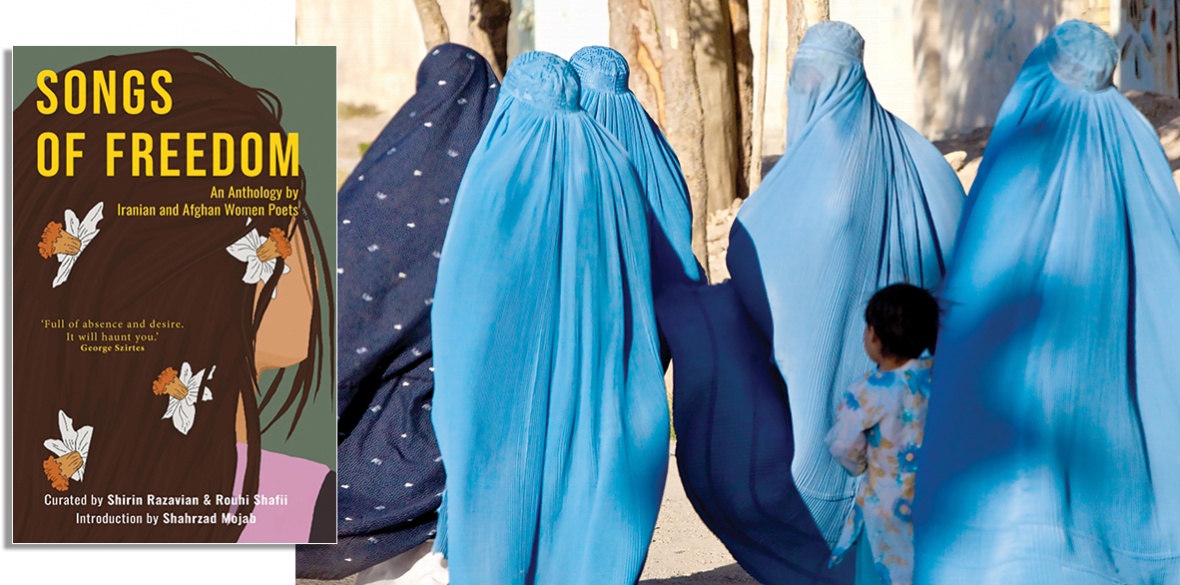This is the last article you can read this month
You can read more article this month
You can read more articles this month
Sorry your limit is up for this month
Reset on:
Please help support the Morning Star by subscribing here
Songs of Freedom: An Anthology by Iranian and Afghan Women Poets
Edited by Shirin Razavian and Rouhi Shafii
Afsana Press, £12.99
I HAD to stop and put this book down after every few poems due to the intensity of expression and the feelings that these brave poets elicited in me, something I have never experienced before.
This is a vital anthology from Afghan and Iranian poets where the political and personal overlap and fuse into a witness-bearing and manifesto-making anthology that everyone should read.
Starting with Azita Ghahreman My Mother’s Eyes, the poets set out on their journey: “In a tight nest I grew wings and feathers. Crows stole my umbilical cord.” Then Ava Homa leads us into streets of protest: “crescendoing our voices shattered stalls/ Storming outside we set our veils ablaze/ Twirling around flames/ That devoured headscarves and our frights.”
These witness telling the world of their struggle ending with: “The Woman, Life, Freedom slogan/ Transcending the fallen/ Raising the torch that shall illuminate/ The tunnel out of which we crawl” (Liberte, Egalite, Sororite) — lines that could win the Pulitzer prize or be painted upon a banner.
Ziba Karbassi asks the reader, in the age of poets selling their souls for an advert or an OBE: “Tell me/ Til now/ How many times have you died/ For a poem.” Sohelia Mirzaei dedicates her poem Close To My Body to her poetry teacher: “You’ve stitched your stains onto my skirt/ Scrub and rub/ Piece by piece/ It has heavy hands this needle.” Her language is vital and metaphorical but accessible and urgent.
Iranian poet Sana Nassari’s short poems Morning Routine and Stoning contain lifetimes of pain and observations: lives remembered, deaths marked and sentences delivered — the reader cannot turn away.
And Nasrin Parvaz’s bio says it all. She became a civil rights activist when the Islamic regime took power in 1979. She was arrested in 1982, tortured and spent eight years in prison.
Woman Life Freedom stunned me into silence, and Black Bird: “Stones as white as a bride’s dress you never wore” made me cry.
In her poem The Invader she juxtaposes a right-wing narrative with the reality of the asylum-seeker dead on the shore. The imagery is haunting and burns into your retina. In Colnbrook Immigration Removal Centre she makes us look closer to home: “You try to figure out how anyone makes money from holding you prisoner.”
In Stoning, Mehrangiz Rassapour takes us directly into the vortex of reality under deathly patriarchy. Her use of repetition with the line “Stone me” is almost too painful to read — I struggle to utter it. Maybe that is the point? Though the author, by claiming it and articulating it diminishes the power of the murderers. It is transcendental in its effect on the page and in your larynx.
Other poems, including Lash and The Ten Year Old Bride are devastating in their vitriolic witnessing.
I am reminded of Ginsberg’s Howl and Andrea Dworkin’s Mercy in these poems. The way the imagery switches from soul to society. An outpouring of long held-in rage rises and erupts in volcanic expression leaving the reader stunned and challenged. Isn’t that what poetry should do — not win prizes?
An anthology as heart-breaking as it is hope-making. Please buy, borrow or steal a copy. We ignore these tragic, hopeful, angry, female voices at our peril.







